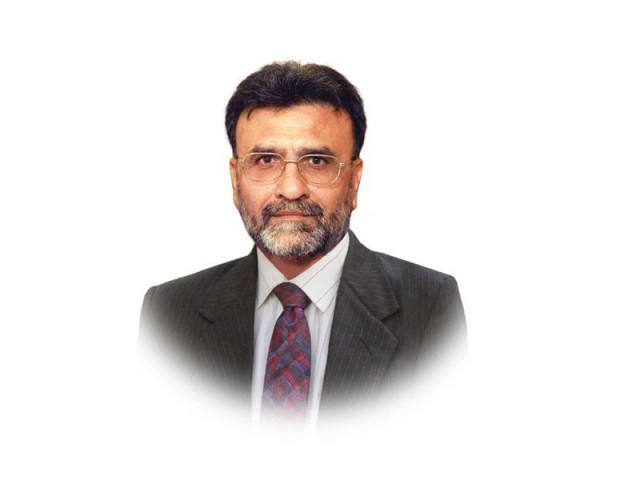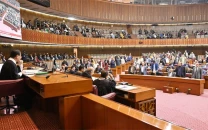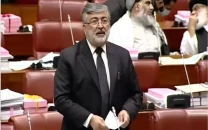Putting new wisdom to work in Balochistan
Jam Yousaf strongly believed that polite pragmatists like him had exhausted their possibilities in Balochistan.

Nusrat Javeed
Since 1985, Jam had been frequently representing his ancestral town of Lasbela in the National Assembly as a member. Although an experienced parliamentarian, he was seldom an active participant in house proceedings.
As a true heir of a sharp but amazingly pragmatic Jam Sahib of Lasbela, he fully knew the limitations of an elitist politician from Balochistan when it came to dealing with establishment quarters of Rawalpindi and Islamabad. For this type, the only option to survive and thrive in politics was to act like an effective tool of patronage politics.
Sticking to this attitude qualified Jam Yousaf to stay put as Balochistan chief minister during the five-year-long charade of the “true and not sham democracy” that was set by General Pervez Musharaf.
As the chief minister, he fully fathomed his ‘limits” and frequently preferred to stay put in Islamabad. The media was not so vocal and vigilant in those days and no one mentioned his absence from Quetta; Nawab Aslam Raisani suffered more criticism in this context.
In spite of being comfortably elected again to the National Assembly in 2008, Jam Yousaf quietly slipped out of Pakistan to live for years in discreet exile. He seriously apprehended that some Baloch militants might get him; simply for the fact that he had been provincial chief minister when Nawab Akbar Bugti was killed through a military-led operation. Even after quietly returning to Islamabad some months ago, he spent most of his time like a recluse. Not many journalists and legislators knew that he had been an avid reader of books on history and international politics. He had rather doggedly established the reputation of a humble simpleton about his person.
While sitting with friends he could trust, there would come some rare moments, though, when he would explain the helplessness of usual politicians like him with stunning but cynical one-liners.
Close to his death, he turned more reclusive and mostly preferred to spend his time in playing video games while glued to his bed. He strongly believed that polite pragmatists like him had exhausted their possibilities in Balochistan. His own son and political heir also turned almost a stranger to him. Jam Sahib would feel doubly upset over the fact that instead of turning into a radical, “he had gone over to Tableeghi Jamaat and was no more able to hold any rational discussion.” Knowing him a bit, I am forced to suspect that the stressful life of a loner was the real cause of his sudden death.
The National Assembly will not be meeting on Tuesday. Taking advantage of the national holiday that we hypocritically savour in the name of expressing “solidarity with people of Kashmir” most of our representatives may well be spending their day relaxing with families and friends. They are scheduled to attend a joint parliamentary session on Wednesday, which has ostensibly been summoned to approve the enforcement of governor’s rule in Balochistan. But a weighty set of politicians from various parties that have representation in the coalition government has started telling us that the idea of furnishing parliamentary endorsement to governor’s rule in Balochistan has been dropped. The JUI of Maulana Fazlur Rehman continued to stay put in the coalition government in Balochistan even after pulling out its ministers from the government in Islamabad. From day one, this party has been fiercely opposing the suspension of the Balochistan government. Now, Maulana’s party is firmly supported by Chaudhry Shujaat Hussein and his PML-Q. Both these parties have ganged up on President Zardari to force him into restoring the provincial government.
They insist that the motivating concern for them was not the rehabilitation of Raisani. The one and only objective is to facilitate smooth transition to the next election by developing consensus for the caretaker arrangement that should oversee holding of the next election in the most volatile province of Pakistan. The armed militants in that province had vowed to get those politicians who intend to participate in the coming election which, according to their perception, “legitimise the occupation of Balochistan by the Punjabi establishment.” Maulana Fazlur Rehman and Chaudhry Shujaat strongly feel that governor’s rule in that province would alienate the “patriotic and cooperative” politicians like Raisani. It will be wise to restore him and then press for getting a caretaker government in Balochistan that inspires trust and helps ‘pragmatic nationalists’ to participate in the next election. Who should head this government?
None of them had any clear answer to it and Raisani prefers savouring the last laugh these days. All establishment quarters appear clueless regarding the next move and we are yet not informed, via an appropriate notification, whether the officially summoned joint parliamentary sitting is being held or not on Wednesday.
Published in The Express Tribune, February 5th, 2013.



















COMMENTS
Comments are moderated and generally will be posted if they are on-topic and not abusive.
For more information, please see our Comments FAQ